The Economics and Statistics Division maintains archives of previous publications for accountability purposes, but makes no updates to keep these documents current with the latest data revisions from Statistics Canada. As a result, information in older documents may not be accurate. Please exercise caution when referring to older documents. For the latest information and historical data, please contact the individual listed to the right.
<--- Return to Archive
For additional information relating to this article, please contact:
March 20, 2024NEW BRUNSWICK BUDGET 2024-25 The Province of New Brunswick has tabled its provincial budget for 2024-25.
New Brunswick estimates a 2024-25 surplus of $40.86 million, following a $247.387 million surplus now forecast for the 2023-24 fiscal year. Over the next two fiscal years, New Brunswick anticipates running similar surpluses to 2024-25: $39 million in 2025-26 and $30 million in 2026-27.
For 2024-25, New Brunswick's revenues are projected to grow by 4.7% (from the latest 2023-24 forecast) while expenditures are projected to grow by 6.4%. In 2025-26, revenue growth is projected to slow to 2.5%, matching the pace of growth in expenditures. In 2026-27, revenue growth is projected to accelerate to 2.9% while expenditure growth quickens to 3.0%.
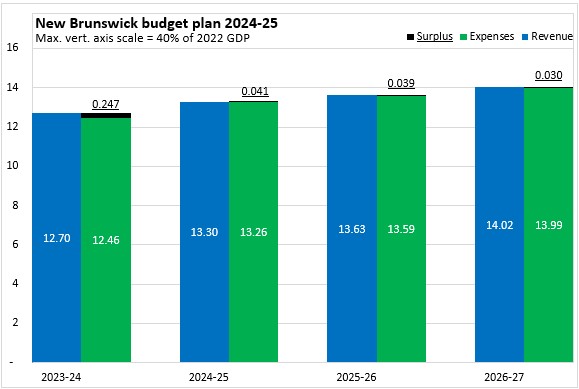
Measured as a share of GDP, the footprint of provincial government in the New Brunswick economy is expected to decline slowly from 28.0% in 2024-25 to 27.5% of GDP in 2025-26 and 27.2% of GDP in 2026-27. New Brunswick's deficits are projected to be 0.1% of GDP in each of the next three fiscal years.
New Brunswick's net debt for 2024-25 is projected to amount to 26.7% of nominal GDP. The net debt to GDP ratio is projected to decline to 26.0% in 2025-26 and to 25.6% in 2026-27.
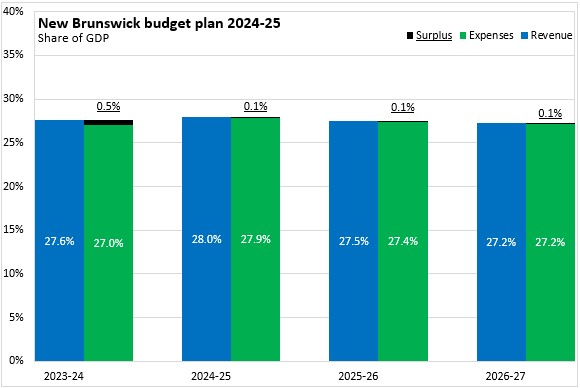
New Brunswick's expenditures in 2024-25 amount to $15,569 per capita. These expenditures are projected to rise to $15,725 per capita in 2025-26 and to $16,034 per capita in 2026-27. New Brunswick's surplus amounts to $48 per capita in 2024-25, $45 per capita in 2025-26 and $34 per capita in 2026-27.
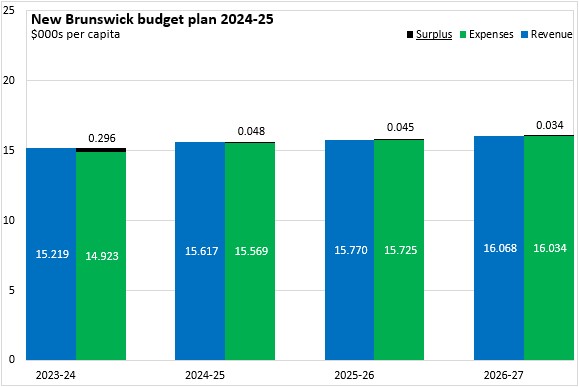
New Brunswick's revenues grew from 2022-23 to 2023-24 while the 2023-24 Budget anticipated that revenues would decline. With higher revenues, the New Brunswick Budget plan for 2024-25 now anticipates higher expenditures.

After outperforming expectations in the last two fiscal years, New Brunswick's estimated surpluses for 2024-25 and 2025-26 are very similar to levels projected in the 2023-24 Budget's multi-year plan.
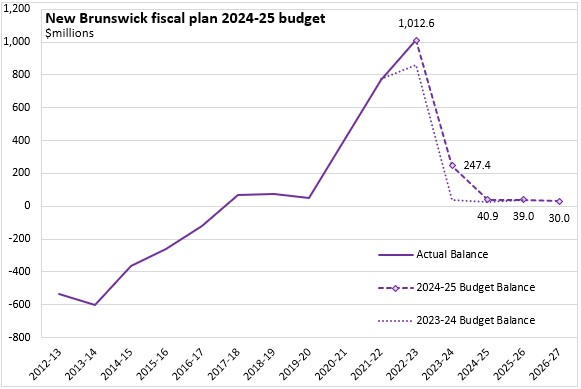
The New Brunswick Budget assumes that the province's real GDP growth will slow to 0.7% in 2024 as labour markets, wage growth and household consumption are expected to decelerate. Investment activity is also projected to slow in light of tighter financial conditions. Public sector investments are projected to support growth in the next year, though the Budget document notes the risks associated with limited capacity, labour shortages and higher costs in the construction sector. New Brunswick anticipates that housing investment and exports will be stable. The forest products industry is expected to weather headwinds from declining US housing construction and higher tariffs. New Brunswick's tourism is assumed to return to pre-pandemic levels. Fisheries and aquaculture production are forecast to generate smaller volumes, but at higher prices.
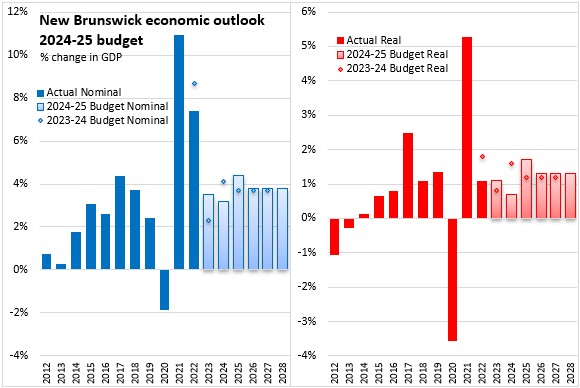
Key Measures and Initiatives
New Brunswick's 2024-25 Budget prioritizes dependable public health care, energizing the private sector, safe communities, supporting vulnerable populations, housing and building a better education system. Highlights include:
Dependable health care
- $70 million to ease pressures at regional health authorities
- $23 million for technology initiatives to improve access
- $20 million to expand collaborative practices
- $562,000 to expand midwifery services
- $7.1 million to fund agreements with cataract surgical centres
- $7 million in additional funding for mental health and addictions services
- $1.4 million for marketing to attract and recruit health-care professionals
- Offering an incentive program to fill nursing positions
- $2.9 million to support screening programs for colon cancer, breast cancer, lung cancer, HPV cervical cancer, and oncology drugs
- $2.1 million for additional resources to ensure appropriate care is provided to survivors of sexual or domestic violence.
Energizing the private sector
- $3.4 million for immigration support
- Reducing certification barriers for internationally trained workers in regulated professions
- $50 million for the Enhanced Energy Savings Program to provide free heat pumps, air sealing and insulation
- $5 million to support energy conservation for people who use non-electric fuel
- $12.5 million for nuclear energy
Safe communities
- $6.6 million to address increased demands for driver testing, inspection/enforcement services, accommodate increased court caseloads and inmate populations
- $5.3 million for community safety
Supporting vulnerable populations
- An increase of 3.6% for social assistance recipients under the Transitional Assistance Program and Extended Benefits Program
- $29.7 million to increase wages for personal support workers
- $2.2 million to increase the per diems in adult residential facilities
- Increasing the base amount of the Low-Income Seniors’ Benefit to $600 from $400 (indexed to the CPI)
- Providing a monthly household supplement for social assistance recipients and youth engagement services recipients
Housing
- $68.9 million for the New Brunswick Housing Corporation
- $22 million for a direct-to-tenant rental benefit
- $9.0 million (Canada Housing Benefit) for 1,200 households and to support survivors of gender-based violence
- $3 million for the Rent Bank to reduce the risk of eviction
- $11 million in permanent funding for homelessness
- $2.5 million for repair of rental units
- $2.6 million for Habitat for Humanity
- $20 million for small community infrastructure
- $2.5 million for pre-construction work on affordable housing
Building a better education system
- $7.4 million increased funding through the Canada-New Brunswick Canada-wide Child Care Agreement
- $4.4 million to support children with autism spectrum disorder
- $18.6 million to address challenges resulting from enrolment growth
- $24.3 million to address rising education operating costs
- $1.1 million to address costs associated with opening new schools in Fredericton and Moncton
- $2.5 million to support language learning for immigrant students
- $7.4 million to provide student services
- $7.8 million to reverse the effects of instruction time lost during the pandemic
- $4.1 million for teacher recruitment and retention, enhanced virtual learning and leadership development
New Brunswick Budget 2024-25
<--- Return to Archive